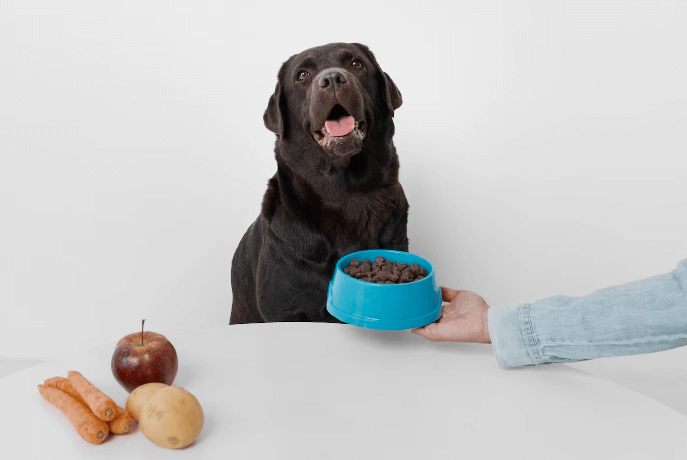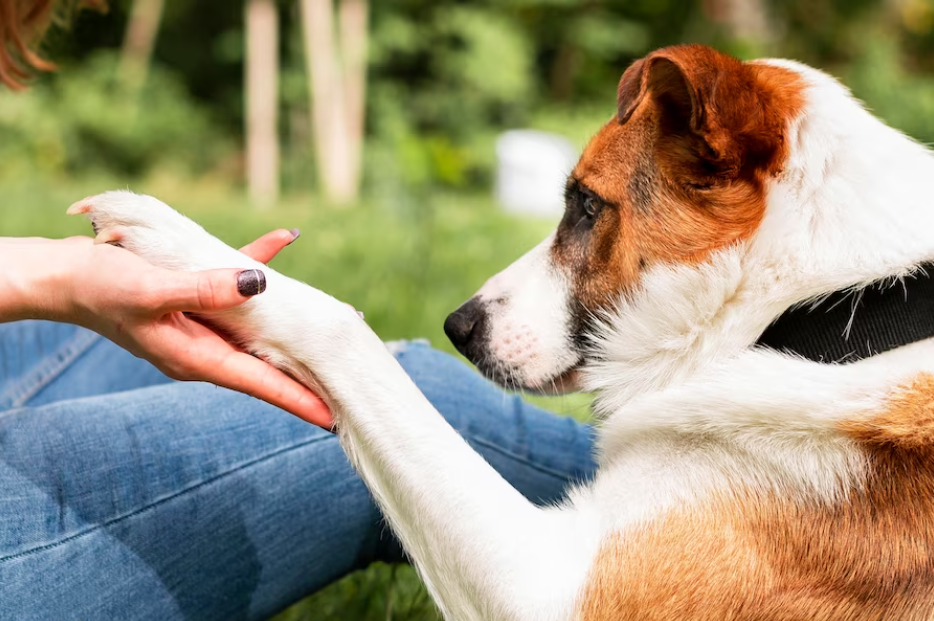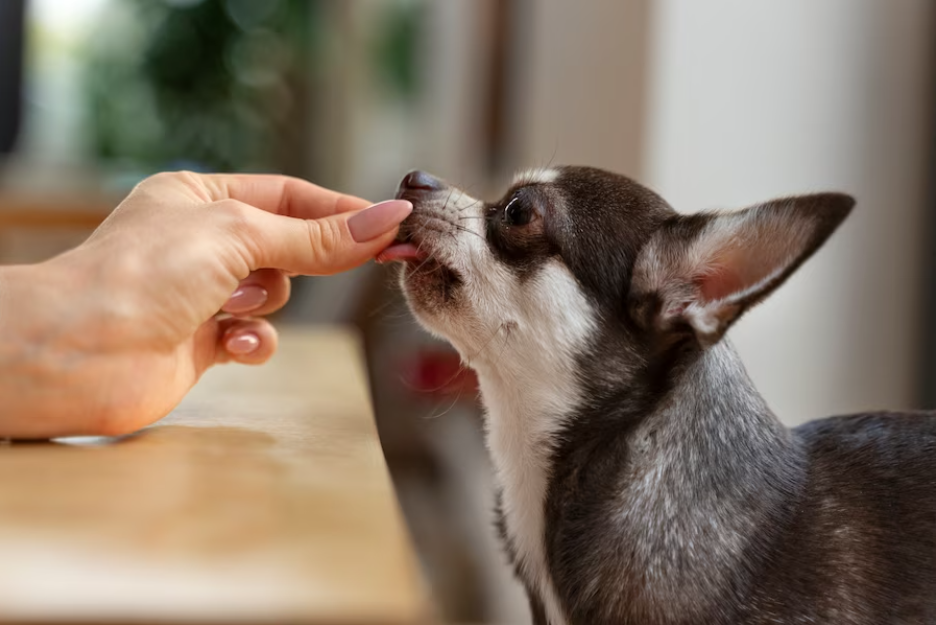Can Dogs Have Baked Beans? Risks and Alternatives

Baked beans are a popular dish enjoyed by many people around the world. But can our furry friends, dogs, safely indulge in this tasty treat? As a responsible pet owner, it’s important to know the potential risks involved before sharing any human food with your canine companion.
While baked beans can be a tasty and nutritious source of protein and fiber for humans, they may not be suitable for dogs. Most canned baked beans contain ingredients such as onions, garlic, and various seasonings, which can be harmful to our four-legged friends. Onions and garlic, in particular, are known to be toxic to dogs and can cause damage to their red blood cells.
However, there are alternatives that you can consider to satisfy your dog’s craving for beans. Plain, cooked beans, such as kidney beans or green beans, can be a safe and healthy option for your furry friend. Just make sure to prep them without any added salt, spices, or seasoning.
Potential Risks of Feeding Dogs Baked Beans
While it may be tempting to share your favorite baked beans with your furry friend, it is important to understand the potential risks involved.
1. Digestive Issues
Dogs have a sensitive digestive system, and the high fiber content in beans can cause gas, bloating, and diarrhea. This can be uncomfortable for your dog and may require a visit to the vet.
2. Salt and Seasonings
Baked beans often contain high levels of salt and other seasonings like onions, garlic, and spices that can be toxic to dogs. Salt can lead to dehydration and electrolyte imbalances, while certain seasonings can cause digestive upset or damage to their red blood cells.
It is crucial to avoid feeding your dogs baked beans that contain these additives to keep them safe and healthy.
Healthier Alternatives
If you still want to treat your dog to a bean-based snack, there are alternatives that are safer and better for their health. Some options include:
AlternativeDescription
| Plain, Cooked Beans | Plain cooked beans, such as chickpeas or pinto beans, can be a healthy addition to your dog’s diet. Just make sure to avoid seasoning them with anything that may be harmful to dogs. |
| Pumpkin | Pumpkin is a great source of fiber and can be beneficial for dogs with digestive issues. However, opt for plain, canned pumpkin without any added sugars or spices. |
| Dog-Friendly Recipes | There are many recipes available online for homemade dog treats that incorporate beans in a safe and healthy way. These recipes often use dog-friendly ingredients and avoid harmful additives. |
Remember, before introducing any new food into your dog’s diet, it is always best to consult with your veterinarian.
Digestive Issues and Gas
When it comes to feeding dogs baked beans, there are several digestive issues and gas that can occur. Baked beans are high in fiber and carbohydrates, which can be difficult for dogs to digest. This can lead to stomach upset, diarrhea, and gas. The complex sugars found in baked beans, called oligosaccharides, can also cause gas and discomfort.
If your dog eats a large amount of baked beans, it’s important to monitor them closely for any signs of digestive issues. Some dogs may be more sensitive to the high fiber content and may experience more severe symptoms. If you notice any changes in your dog’s bowel movements or behavior, it’s best to consult with your veterinarian.
Understanding the risks associated with feeding dogs baked beans, it’s important to consider healthier alternatives. Instead of baked beans, you can opt for plain cooked beans such as kidney beans, black beans, or green beans. These are lower in fiber and gentler on your dog’s digestive system. It’s always important to introduce new foods gradually and monitor your dog for any adverse reactions.
Additionally, it’s essential to ensure that the beans are cooked thoroughly and without any added seasonings or ingredients that may be harmful to dogs. It’s always best to consult with your veterinarian before making any changes to your dog’s diet to ensure their health and well-being.
Sodium and Sugar Content
When it comes to feeding your dogs baked beans, it’s important to understand the potential risks associated with the sodium and sugar content. While baked beans can be a tasty treat for humans, they may not have the same effect on our canine companions.
Baked beans are typically high in sodium, as they often contain added salt for flavor. While a small amount of sodium is necessary for dogs, excessive intake can lead to health problems such as dehydration and kidney damage. It’s best to avoid giving your dogs baked beans that are high in sodium.
In addition to sodium, baked beans can also be high in sugar. Dogs metabolize sugar differently than humans do, and consuming too much sugar can lead to weight gain, diabetes, and dental issues. If you decide to feed your dogs baked beans, be sure to choose options that are low in sugar or consider healthier alternatives.
Understanding Serving Sizes
When it comes to giving your dogs baked beans, serving sizes are crucial. While a small amount of baked beans can be a safe and occasional treat, it’s important not to overfeed your dogs. Too many baked beans can lead to digestive issues such as gas, bloating, and diarrhea.
If you choose to feed your dogs baked beans, remember to only give them a small portion and monitor their reaction. It’s always a good idea to consult with your veterinarian before introducing any new food into your dog’s diet.
Healthier Alternatives
If you’re looking for a healthier alternative to baked beans for your dogs, there are several options to consider. You can try offering them plain cooked beans, such as kidney beans or black beans, as they are low in sodium and sugar. Make sure to cook the beans thoroughly to make them easier for your dogs to digest.
Another option is to incorporate vegetables into your dog’s diet. Carrots, green beans, and peas can be steamed or boiled and served as a nutritious snack. These vegetables are low in sodium and sugar and provide essential vitamins and minerals for your dog’s overall health.
Remember, it’s always important to prioritize your dog’s health and well-being. While baked beans can be tempting to share with your furry friend, understanding the risks associated with the sodium and sugar content can help you make more informed decisions about their diet. By choosing healthier alternatives, you can ensure that your dog stays happy and healthy.
Disclaimer: The information in this article is for educational purposes only and is not intended to replace the advice of a veterinarian or professional dog trainer.
Possible Allergic Reactions
Dogs can have various allergic reactions to certain foods, including baked beans. It’s important to be aware of the risks and monitor your dog for any adverse reactions after consuming baked beans.
Some common signs of an allergic reaction in dogs can include:
- Itchy skin or rashes
- Hives or swelling
- Vomiting or diarrhea
- Difficulty breathing
- Excessive drooling or salivating
If your dog exhibits any of these symptoms after eating baked beans, it’s best to consult with your veterinarian to determine whether they are experiencing an allergic reaction. Your vet can provide guidance on how to manage the allergy and recommend appropriate alternatives to baked beans.
Remember, every dog is unique and may react differently to certain foods. It’s best to introduce new foods gradually and monitor your dog’s reactions closely to ensure their safety and well-being.
Healthier Alternatives to Baked Beans
Understanding the risks associated with feeding dogs baked beans, it is important to consider healthier alternatives that can provide similar nutritional benefits without the potential negative side effects. While baked beans may be tempting to share with your furry friend, it is best to opt for safer options.
1. Green Beans
Green beans offer a great alternative to baked beans. They are low in calories and high in fiber, making them a healthy snack that can aid in digestion. They also contain essential vitamins and minerals, such as vitamin C and vitamin K.
2. Peas
Peas are another nutritious alternative to baked beans. They are packed with vitamins and minerals, including vitamin A, vitamin C, and potassium. Peas are also a good source of protein and can be easily incorporated into your dog’s diet.
When introducing any new food to your dog’s diet, it is important to do so gradually and in moderation. It is also recommended to consult with your veterinarian before making any changes to ensure that your dog’s specific dietary needs are being met.
Lean Proteins for Dogs
Understanding the importance of a balanced diet for dogs is crucial to ensuring their overall health and well-being. While baked beans may be a tasty treat for humans, it’s important to remember that not all human foods are safe for dogs to consume.
When it comes to protein sources for dogs, it’s essential to provide lean options that are both nutritious and safe. While baked beans may contain protein, they often come with added ingredients like salt, sugar, and other seasonings that can be harmful to dogs. It’s best to avoid feeding baked beans to your furry friend to prevent any potential health risks.
Instead, there are several healthier alternatives to consider when incorporating lean proteins into your dog’s diet. Some excellent choices include:
1. Chicken: Cooked boneless, skinless chicken breast is a lean protein option that provides essential amino acids for dogs without any added ingredients. Just make sure to remove any bones and seasoning before serving it to your pup.
2. Turkey: Similar to chicken, cooked boneless, skinless turkey meat is a lean protein source that dogs can enjoy. It’s essential to ensure there are no bones or seasonings present and that the turkey is thoroughly cooked.
3. Fish: Certain types of fish, such as salmon or whitefish, can be a great source of lean protein for dogs. Just be sure to remove any bones and cook the fish thoroughly before feeding it to your furry companion.
4. Greek yogurt: Plain, unflavored Greek yogurt is another excellent lean protein option for dogs. It’s important to check the ingredient list to ensure there are no added sugars or artificial sweeteners, as these can be harmful to dogs.
Remember, when introducing any new protein source to your dog’s diet, it’s essential to do so gradually and monitor their reactions. If you notice any gastrointestinal upset or allergic reactions, consult your veterinarian for guidance.
By understanding the importance of lean proteins for dogs and choosing safe alternatives to baked beans, you can ensure your furry friend receives a balanced and nutritious diet that promotes their overall health and well-being.
Vegetables That Are Safe for Dogs
When it comes to feeding dogs, it’s important to know which foods are safe and which ones can pose risks to their health. While baked beans may be a favorite for humans, they are not recommended for dogs as they contain ingredients that can be harmful to them. The high salt and sugar content in baked beans can lead to obesity, diabetes, and digestive issues in dogs.
Fortunately, there are plenty of alternatives that are safe and healthy for dogs to eat. Here are some vegetables that you can add to your dog’s diet:
Carrots
Carrots are a great source of vitamins and minerals for dogs. They are low in calories and high in fiber, making them a healthy option for dogs. You can give your dog raw or cooked carrots as a crunchy and nutritious treat.
Green Beans
Green beans are another safe vegetable for dogs. They are low in calories and packed with vitamins. Green beans can be served steamed, boiled, or raw as a tasty snack or added to your dog’s regular meals to add some variety.
VegetableCan Dogs Eat?
| Carrots | Yes |
| Green Beans | Yes |
Other safe vegetables for dogs include broccoli, pumpkin, sweet potatoes, and peas. Remember to always introduce new foods gradually and in moderation to avoid any stomach upset. If you have any concerns about feeding vegetables to your dog, it’s always a good idea to consult with your veterinarian.
By offering your dog a variety of safe vegetables, you can provide them with a nutritious diet that supports their overall health and well-being.



